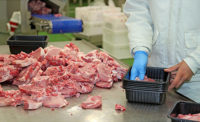Editor-in-chief Andy Hanacek spoke with We R Food Safety! consultant Abbey Davidson about why employee training is key and how to improve upon some basic food safety training rules.
Andy Hanacek: Thanks so much for joining me today and talking a little bit about the food safety things you’ve seen out in the industry. We were chatting off camera, and we were talking about employee training and how you’ve seen that somewhat of an ongoing food safety issue of plants you’ve visited. Can you tell me what you’ve seen and why you are kind of highlighting that as a food safety issue that you would like to see solved?
Abbey Davidson: Recently I took a trip across through some states to see some meat plants, and within those meat plants, across the board, there were issues with hand washing. You cannot hand wash enough in a facility no matter what you are doing and what food you are working with. Hand washing is super important. If employees are understanding that background and the “why”… we all know hand washing is important. It is going to reduce the bacterial load on your hands. That’s basic common sense. We teach that in kindergarten. It’s knowing the “why” behind it, knowing certain pathogens that you can transfer on your hands, to get people to understand and know that hand washing is important. That’s a really small part of employee training that I think we need to focus on, because a small part of employee training could transfer into a huge issue within the industry.
Hanacek: What are your thoughts on the training programs that are out there, because you go to some of these shows and “hand washing, hand washing” and there’s all kinds of programs. Where’s the disconnect, and what are your thoughts there on that?
Davidson: I thought of the same thing. There are some facilities that are fantastic with personal hygiene. They are fantastic with teaching an employee how to work a grinder or clean a surface. The problem is consistent training. You go and train an employee for 20 minutes, and they get this concept, this subject. You come back two months later, and they are doing it their way, a completely different way than you showed them. Maybe it’s a quicker way. Maybe it’s a more efficient way. Maybe it’s a way that does work, but that’s not how you trained them to do the task. Consistent training is very important. We were talking off camera a little bit about if you train an employee for three hours today and you have to retrain them two hours in total for the next month. Is that three hours plus that two hours for a total of five hours worth the $50,000, $500,000 product loss you have to go through because they got somebody sick or a piece of plastic was in the product you sent out or whatever it may be. Consistent training is something that takes time, but it’s necessary.
Hanacek: What’s the overall goal then with that consistent implementation and utilization of an employee education program? Other than obviously food safety and avoiding an outbreak and things like that.
Davidson: I think the main number one goal we are all concerned about is food safety. We have to make sure that is hit on the head and we cover our bases. The second goal is the rate of investment or return on investment, whatever you want to call it. Say again, let’s take the five hours versus $100,000 or $500,000… is that really what you are going to be paying your employee? The other part that I like to think about is when you train an employee and you train them well, no matter what the task may be, they are going to take pride in what they do, because they know they are doing it correctly. If you know you are doing your job correctly, you are probably going to enjoy it a little more than if you make it up. So if you enjoy your job a bit more then your employees are going to be happier. They are going to stick around. Plus, if you are training them correctly, then you are going to be able to make sure they are an expert in what you train them in. Once they have that in place, they can be cross-trained and become more valuable to your company, so holding on to those employees is going to save your time hiring new people to do those jobs. This is a tenfold situation that can go on to so many other areas.





Report Abusive Comment